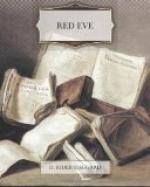“So much for business, but there are two things more: I have no relatives living save my wife’s sister. Therefore, Sir Hugh and Captain Richard, I have made you my joint heirs with her; my testament duly signed and witnessed is in that case with the other papers. My wealth is not great. Still there are certain land and manors in England, a sum of money placed with a merchant in London, whose name you will find written in the testament, my plate and gold coin here, though the former you may not be able to move. Therefore I charge you to bury it and return for it later on, if you can. It is of value, since all my life I have collected such trinkets. I beg you to make provision also for this good lad, David, should he be spared.”
He paused a while, for he was growing very weak, then added:
“Another thing is that I ask you, if it be possible, to row my body out to sea and there sink it in deep water, deep, clean water, far from this place of stench and pestilence, for I would not lie in the common pit at last. Now kneel down and pray for my passing soul, since there is no priest to give me absolution, and I must seek it straight from God. Nay, thank me not. I have done with the world and its affairs. Kneel down and pray, as I pray for you, that you may be spared on earth and that we may meet again in heaven, where my wife and others await me.”
They obeyed, weeping, yes, even Grey Dick wept a little. Presently when they looked up they saw that Sir Geoffrey was dead, dead without pain or sorrow. Of the first he had suffered none for days, and the second was far from him who wished to die.
Leaving the ancient woman in charge of the house, which she barred and bolted, next morning they took a boat, and the three of them rowed the body of the old knight a league out into the quiet sea. There, after a brief prayer, they cast him into the deep, weighted with stones, so that he might never rise again.
Then they returned, not too soon, for they found thieves in the act of breaking into the house, probably in search of food. These miserable, half-starved men they spared, though they could have killed them easily enough. They even gave them a pouch full of biscuit and dried meat ere they dismissed them. This they did quickly, since one of them, as they could see, was already stricken by the plague and had not long to live. When they were gone, the old woman being out of the house, whence she had fled on hearing the robbers, they collected all Sir Geoffrey’s and his lady’s jewels and plate, of which there was much, for he lived in state in Venice, as became an ambassador. These they buried in three large iron boxes beneath the flagstones of the cellar, the safest place that they could find. Having thrown the excavated earth into the canal under cover of the dark, they replaced these stones and strewed dust over them.




